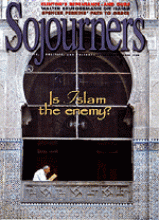The movie and television media create, support, and perpetuate negative images of people in some ethnic groups. For more than a half-century, media giants have encouraged a climate and culture of hate, in which irresponsible rhetoric dominates and insensitive stereotyping promotes prejudice.
My formative years were influenced greatly by both these negative images and an alternative vision at home. Those of us who grew up in the 50s found one of three things in almost every African-American home: a wall-hanging or framed setting of the Ten Commandments, the Lords Prayer, or the 23rd Psalm.
Within this context, quite frankly, I did not at first look favorably upon a recently published childrens book, The Twenty-third Psalm, illustrated by Tim Ladwig. The power of stereotypical images makes one wary.
But because this psalm has been an important part of my life for many years (I memorized it just after the "Now I lay me down to sleep" prayer and the pledge of allegiance), I took another look at Ladwigs illustrations. Slowly I began to see what the illustrator was doing. From the beginning line, "The Lord is my shepherd," to the end, "and I will dwell in the house of the Lord forever," Ladwig is asking us to re-examine the psalm and to apply the phrases to our everyday practice of faith, hope, and unconditional love.
The illustrator serves as the eyes and ears of people who live in the inner city. He gives a perspective on this world for those who ride through in locked cars and flee at 5 p.m. He shows a brother and sister living in the midst of urban reality. They are blessed to have loved ones who turn to God for guidance as part of their daily life. Even a reader who does not have the faith of this family will be impressed by the strength and solace their faith in God gives them.
Read the Full Article
